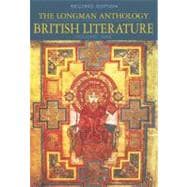
Note: Supplemental materials are not guaranteed with Rental or Used book purchases.
Purchase Benefits
(* means the selection is new to this edition.)
THE MIDDLE AGES.
Before the Norman Conquest.
Beowulf.
The Táin Bó Cuailnge.
Early Irish Verse.
Judith.
The Dream of the Rood.
Taliesin.
The Wanderer.
Wulf and Eadwacer and the Wife's Lament.
Riddles.
After the Norman Conquest.
Arthurian Romance.
Marie de France.
Sir Gawain and the Green Knight.
Sir Thomas Malory.
Geoffrey Chaucer.
William Langland.
Mystical Writings
Julian of Norwich.
Medieval Cycle Dramas.
The Second Play of the Shepherds.
*The York Play of the Crucifixion.
*Vernacular Religion and Repression.
Margery Kempe.
Middle English Lyrics.
The Tale of Taliesin.
Dafydd Ap Gwilym.
Middle Scots Poets.
William Dunbar.
Robert Henryson.
*Late Medieval Allegory.
*John Lydgate.
*Mankind.
*Christine de Pisan.
THE EARLY MODERN PERIOD.
*John Skelton.
Sir Thomas Wyatt.
Henry Howard, Earl Of Surrey.
Sir Thomas More.
George Gascoigne.
Edmund Spenser.
Sir Philip Sidney.
Isabella Whitney.
Mary Herbert, Countess of Pembroke.
Elizabeth I.
Aemilia Lanyer.
Richard Barnfield.
Christopher Marlowe.
Sir Walter Raleigh.
William Shakespeare.
Sonnets.
Thomas Dekker and Thomas Middleton.
*Thomas Campion.
*Michael Drayton.
Ben Jonson.
John Donne.
Lady Mary Wroth.
Robert Herrick.
George Herbert.
Richard Lovelace.
Henry Vaughan.
Andrew Marvell.
Katherine Philips.
The Development of English Prose.
Francis Bacon.
The King James Bible.
Lady Mary Wroth.
Thomas Hobbes.
Sir Thomas Browne.
Robert Burton.
John Milton.
THE RESTORATION AND THE EIGHTEENTH CENTURY.
Samuel Pepys.
Mary Carleton.
Margaret Cavendish, Duchess of Newcastle.
Poems and Fancies.
John Dryden.
Aphra Behn.
John Wilmot, Earl Of Rochester.
*William Wycherley.
Mary Astell.
Daniel Defoe.
Jonathan Swift.
Alexander Pope.
Lady Mary Wortley Montagu.
*John Gay.
William Hogarth.
James Thomson.
Thomas Gray.
Letters.
Samuel Johnson.
James Boswell.
Hester Salusbury Thrale Piozzi.
Oliver Goldsmith.
*Richard Brinsley Sheridan.
Political and Religious Orders.
Money, Weights, and Measures.
Glossary of Literary and Cultural Terms.
Bibliographies.
Credits.
Index.
The New copy of this book will include any supplemental materials advertised. Please check the title of the book to determine if it should include any access cards, study guides, lab manuals, CDs, etc.
The Used, Rental and eBook copies of this book are not guaranteed to include any supplemental materials. Typically, only the book itself is included. This is true even if the title states it includes any access cards, study guides, lab manuals, CDs, etc.